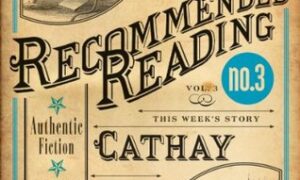 Dickinstein: Emily Dickinson – Mad Scientist by Shannon Yarbrough
Dickinstein: Emily Dickinson – Mad Scientist by Shannon Yarbrough
My rating: 3/5 cats
okay, before you guys all start bracing yourself to read yet another monsterporn review from me—unclench. despite the suggestive title, there is not one scrap of monsterporn in this book. sometimes a dickenstein is just a dickinstein.
nor is it one of those campy monster mashups where famous authors fight vampires or zombies endeavor to bring austen’s prose back from the dead.
this is, believe it or not, a serious and sensitive treatment of “what if emily dickinson read Frankenstein and decided to try to recreate its experiment in her spare time??”
i know. how can that exist and not be camp?? but it’s true.
it seems that shannon yarbrough has done his research into the life of emily dickinson. i say this with authority even though the things i know about emily dickinson’s personal life are:
not super-outdoorsy, but really into celebrating nature
preoccupied with death
dressed in all-white
secretive about her poetic outpourings
hope = thing with feathers
but after a quick wikipedia-gloss, and having read the author’s note:
I gave much attention to preserving the character and real-life persona of Emily Dickinson within my fictional realm I created for her, though I know scholars who have studied her longer than I have will certainly find fault in my depiction of her. Any mistakes are my own or purely fiction. Her poetic themes of death and immortality were the easiest for me to rely upon. During my research, I focused on and included other real life events and acquaintances of Emily. The biggest change I made to fit my story was the timeline surrounding when Emily attended school. That, and oh yeah, I made Emily into a mad scientist.
that’s a man i can trust to give me the skinny on emily dickinson’s time and family and background.
as for the mad scientist part…so emily is all hopped up on milton and transcendentalist emerson and “Nature is God’s interpretation of science” and all, and after reading Frankenstein, she thinks to herself, “huh. bet i could do that.” but in more appropriate emily dickinson words.
and she does.
she is conflicted about it; the meddling with god’s will and all, but she manages to find some biblical verse to guide her in her experiments, particularly corinthians 15:21 and :26
–For since by man came death, by man came also the resurrection of the dead.
–The last enemy that shall be destroyed is death.
She interprets those passages thusly:
Those verses helped Emily to find reassurance that her work did not go against the teachings of God. Others (koff)* might think she was taking those verses out of context, but to Emily the Bible as a whole didn’t make much sense unless it was studied out of context. The themes of its stories or the matter of its verses were meant to be applied to one’s life however they saw fit and just. The Bible provided guidance and direction, but it also supplied inspiration. That was the joy of any book; each individual reader received a different message from it.
*koff mine. but it’s not like the bible hasn’t been broadly interpreted to justify all manner of behavior and belief. parables: no way to run a business.
While a second life, with breath aided by human hand, went against everything organized religion believed in, as long as it served nature well, and man’s purpose behind doing it remained good, there should be no harm.
right? indeed not.
but she only grants “second life” to god’s small, soulless creatures who are not eligible for a proper afterlife. this is her gift to nature. and she gives herself a set of rules, one of which is that she doesn’t create dead bodies upon which to experiment—sixth commandment and all. she’s emily freaking dickinson—she’s not gonna go out and strangle a raccoon just to bring a raccoon back to life. and fortunately, she manages to come across quite a few dead animals lying around on the ground that suit her other rules: natural deaths only, fresh corpses, no visibly destroyed limbs or disease…death kindly stops animals for her time and time again.
as for the science. i mean—emily dickinson was a smart cookie, and very progressive for her time, and while she does remark upon how Frankenstein does not give a description of its galvanizing machine, she still manages to make one that works. basically, all you need is some salt water, a bell jar, a corpse, a battery, some copper and brass, and some blue lightning-stuff. is it the most convincing reanimation novel i have read? nah, but this book isn’t about the science. it’s not about convincing you this could have happened; it’s just a philosophical and spiritual character study of a woman with a big heart who tried to give a gift back to nature.
but of course, once you tell a man you’ve brought animals back to life, he’s going to see all the human applications of it with the medicine and military and progression of science and decide that one fragile white-clad woman bringing bobolinks back to life is not thinking big enough. men, amiright?
I must say I am captivated by all this. It really is brilliance defined. Have you considered making the machine larger to accommodate other species, a horse perhaps?”
“Or a human?” Emily asked.
“I didn’t want to say that, but the thought did cross my mind.”
“No. I have not considered it.” She tried not to sound disappointed, but she knew the words came out that way.
“Oh? You want no part in that?”
“I don’t think so.”
“That is where science is unfortunate at times. A discovery of such aptitude should really benefit others, I’m afraid.”
“I’d rather be selfish and have it only benefit me,” Emily said.
“Vanity, Miss Dickinson?”
“If I can return one robin to its nest then I have not lived in vain.”
“Well spoken. So, just hypothetically speaking, why not a human then?”
“I believe when it’s our time to go, God shall take us,” Emily said.
“But you don’t feel the same applies in nature?”
“Oh, it applies, but there is a difference.”
“And what is that difference, Miss Dickinson?”
“There are no mistakes in nature. Only humans are aware of the mistakes they make, and sometimes die because of them.”
“Humans can often fix their mistakes if the result is not death.”
“And I see death as the only mistake in nature, and I am fixing it.”
but despite her vague and presumptuous objections and reservations, it all comes down to that old adage: teach a man to fish and he’ll spend all day reanimating fish-corpses, and so things get a little bigger than emily had planned, and she is forced to make some difficult decisions. which she does, in typical practical-capable emily dickinson fashion and with a chimp in a hat.
dickinson’s poetry precedes each chapter, and once it is slid into the context of this story, it makes for some interesting interpretations of her work. this world is not conclusion, indeed.
it’s fun without being campy-fun, and if you are a dickinson fan, it’s worth a read, the way i read all the byron-lit i can because it is fun to see your heroes in new and interesting situations.
and technically—zombie birds.
’nuff said.
read my book reviews on goodreads







